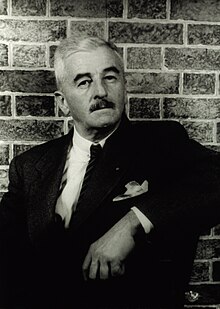Faulkner
| William Faulkner | |
|---|---|

Faulkner in 1954
photographed by Carl Van Vechten |
|
| Born | William Cuthbert Falkner September 25, 1897 New Albany, Mississippi, U.S. |
| Died | July 6, 1962 (aged 64) Byhalia, Mississippi, U.S. |
| Language | English |
| Nationality | American |
| Alma mater |
University of Mississippi (no degree) |
| Period | 1919–1962 |
| Notable works |
The Sound and the Fury As I Lay Dying Light in August Absalom, Absalom! "A Rose for Emily" |
| Notable awards |
|
| Spouse | Estelle Oldham (1929–1962; his death) |
|
|
|
| Signature | |
William Cuthbert Faulkner (/ˈfɔːknər/; September 25, 1897 – July 6, 1962) was an American writer and Nobel Prize laureate from Oxford, Mississippi. Faulkner wrote novels, short stories, a play, poetry, essays, and screenplays. He is primarily known for his novels and short stories set in the fictional Yoknapatawpha County, based on Lafayette County, Mississippi, where he spent most of his life.
Faulkner is one of the most celebrated writers in American literature generally and Southern literature specifically. Though his work was published as early as 1919, and largely during the 1920s and 1930s, Faulkner was not widely known until receiving the 1949 Nobel Prize in Literature, for which he became the only Mississippi-born Nobel winner. Two of his works, A Fable (1954) and his last novel The Reivers (1962), won the Pulitzer Prize for Fiction. In 1998, the Modern Library ranked his 1929 novel The Sound and the Fury sixth on its list of the 100 best English-language novels of the 20th century; also on the list were As I Lay Dying (1930) and Light in August (1932). Absalom, Absalom! (1936) appears on similar lists. His first published story, "A Rose for Emily", is one of the most famous an American has written.
...
Wikipedia
